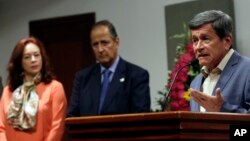Negotiating peace with Colombia's largest active rebel group, the ELN, will be tougher than the recent successful talks with FARC guerrillas because of the ELN's diffuse chain of command and radical ideology, the chief government negotiator said.
President Juan Manuel Santos' administration and the National Liberation Army (ELN) in February began negotiations in neighboring Ecuador that seek to end the role the group has played in a five-decade conflict that has left over 220,000 dead and millions displaced.
Even though both sides have agreed to begin a three-month bilateral cease-fire in October, the road to a definitive peace accord will be long and complex, Santos' negotiator, Juan Camilo Restrepo, told Reuters late Tuesday.
"It's a highly radical, ideological group that totally lacks the pragmatism to negotiate that the FARC had," Restrepo, 70, said in Bogota.
The Santos government signed a peace deal with the larger Revolutionary Armed Forces of Colombia (FARC) in 2016 after negotiations in Havana, Cuba, that lasted four years.
Restrepo, a former finance minister, said the ELN's fractured chains of command and its greater urban support were further complications.
"All those reasons indicate the negotiation with the ELN is more difficult," he said.
Previous talks
Inspired by the Cuban revolution and the Liberation Theology of the Catholic priests that founded it in the 1960s, the 2,000-strong ELN has sought peace before, holding talks in Cuba and Venezuela between 2002 and 2007. Both collapsed with little progress.
The ELN is considered a terrorist group by the United States and European Union for engaging in kidnapping, assassinations, drug trafficking, attacks on economic infrastructure, and extortion of oil and mining multinationals.
Pablo Beltran, the ELN's chief negotiator in Ecuador, has denied there is a weak chain of command and told Reuters last month that the group is united.
During the cease-fire planned to begin October 1, the ELN has pledged to suspend hostage taking, attacks on roads and oil installations, the use of land mines and the recruitment of minors. In turn, the government agreed to improve protection for community leaders and conditions for about 450 jailed rebels.
"There's optimism but not overflowing optimism," said Restrepo, who returns to the negotiating table in Quito, Ecuador, in the next few weeks.
The official warned that although Colombia's military will avoid confrontations with the ELN during the cease-fire, it will go after the group if it engages in criminal activities like illegal mining and drug trafficking.
"Such behavior will be repressed with all the strength of the armed forces," he said.










